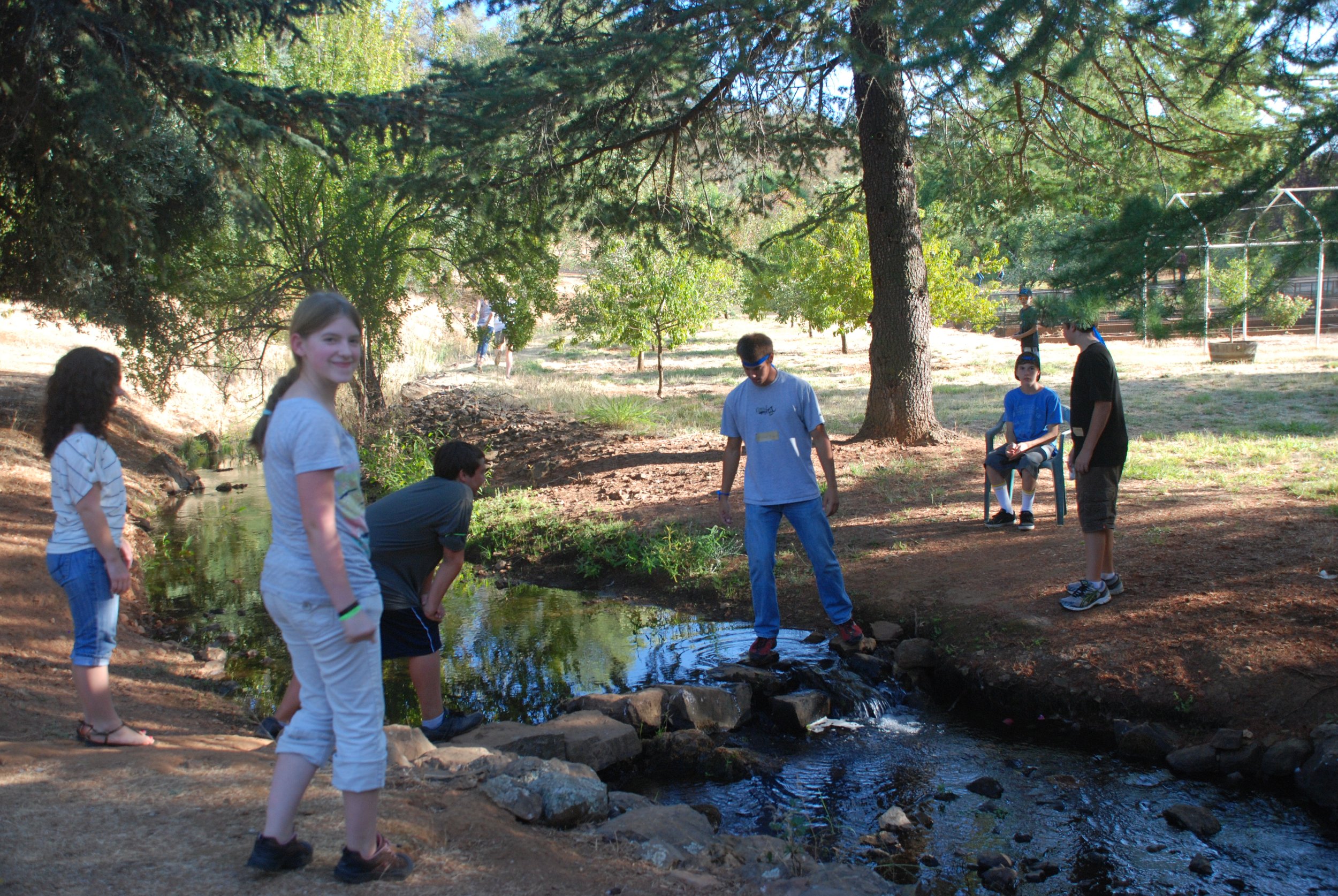
The Community of Our Lady’s Ranch
“IT TAKES A VILLAGE TO RAISE A CHILD”
Neighborhood vs. Community
Community Environment
A Spiritual Way of Life is centered in Jesus Christ with the guidance of Our Blessed Mother through her messages of Medjugorje, “A Way of Salvation.”
A Sustainable Lifestyle is rooted in the wholesome activities of a small family farm, established in a rural setting by “A People Set Apart.”
A Catholic Family Homestead is operated by a small group of people with a common faith, common desires, and common goals. “It Takes a Village to Raise a Child.”
The physical environment is a place endowed with much natural beauty and a variety of water sources, landscape topography, vegetation, and animal habitat. Sprinkled about the landscape are detached dwellings located far enough apart for privacy, yet close enough together for convenience of common activities.
Each dwelling’s orientation promotes front porches and front yards in order to establish a theme of central common area for prayer, social visits, recreation, dining, and communal work. Located at the center of the dwellings are structures built to accommodate these activities, with a small chapel built as the central focus of all community life – Jesus Christ.
Individuals and families live near each other in a harmonious spiritual and natural environment. Their lifestyle mirrors that of the Holy Family (Jesus, Mary, and Joseph) living in the simple setting of Nazareth where prayer, work, and service are joyfully accepted as the primary activities of each day. The desired environment is therefore natural, beautiful, and peaceful – conducive to the goal of all life… love in Christ.
Developing a new way of life begins with a new philosophy about how to live. A new culture of Christian community must replace this current culture of hedonistic individualism. And we must begin in the same way that the early Church began – with small groups of people who practice a common spirituality and a common lifestyle. Within small Christian neighborhoods, we can support one another in faith, family, and farming while developing common bonds of love and service in God’s will.
Each Catholic Homestead Community must be financially independent and sustainable, yet available to support each other on a voluntary basis. Each Community provides for its members a place of sustained balance in the four basic human elements of health and wellness – spiritual, intellectual, emotional, and physical. Facilities and provisions are planned for common prayer, work, dining, and recreation in a socially balanced environment that leaves room for individual thought, creativity, and enterprise.
It is the individual and the family that comprise the Community, so each homestead community is only as strong as the individuals and families that belong. Therefore, each Catholic Homestead Community must bend to the needs and priorities of its members, as opposed to the other way around. The purpose of the Community is to create an environment that is conducive to prayer, love, and peace for all its members, while providing a framework of organization to promote a common spirituality along with a common lifestyle. Each Catholic Homestead Community is only as good as it allows each member the freedom to live and act in its own best interest, including the ability to move in or out of the neighborhood in a financially simple and straightforward way.
A variety of Homestead Types are available to accommodate a variety of personal and social needs. The norm of humanity, since its inception, has been a clan community of the same family or the same tribe. However, in our modern culture, most families desire to live in different parts of the city or state, and in some cases in different parts of the country or world. But when a family wants to “homestead” with an agrarian lifestyle, new opportunities become available for the extended family clan to live together in their own neighborhood. And for those people who don’t have the option to be neighbors with their blood-related family members, they can live in a Catholic Homestead Community in order to live as neighbors with their family in Christ.
Neighborhood Types
Type #1 – THE HOMESTEADING FAMILY
This scenario consists of a single family unit that desires a Catholic - Agrarian lifestyle with Christo-Centric values. Daily interactions allow many bonding opportunities between the parents and their children. Activities include sharing healthy meals together, home-schooling, gardening, on-site recreation, and prayer times that instill in the children a strong work ethic, while promoting the main purpose of life which is “To know, love, and serve God in this life, so as to be happy with him forever in the next.” (Baltimore Catechism, revised edition 1941).
Type #2 – THE EXTENDED FAMILY
This homestead occurs when two, three, or more blood-related families of separate households decide to build a neighborhood together. Grandparents, parents with children, and/or siblings with children can enjoy this opportunity to live as neighbors. This multi-generational option creates communities with a variety of financial options based on each extended family’s needs and desires. After the pioneering family members start a homestead, then more family members usually follow.
Type #3 – THE NEIGHBORHOOD FAMILY
This Catholic Homestead Community neighborhood allows individuals and families who are not blood-related to enjoy a community experience together through a strong bond of unity in Jesus. Each person or family may own property and/or rent a dwelling, while enjoying all the common grounds and facilities together. Farming tasks and daily activities can be shared among families for a more efficient and social way of life, while offering flexibility for vacations and/or retreats. Housing units are available for singles, groups of singles, and/or families who desire to enjoy the advantages of Catholic friendships in a neighborhood setting.
Type #4 – THE ECCLESIAL FAMILY
This fullest model of community life includes a variety of people with a vast array of ages, vocations, and occupations. Families, married couples, singles, priests, sisters, and/or other religious describe the possible vocations present here, while children, parents, and grandparents comprise the majority of this ecclesial neighborhood. Each dwelling unit is separated by land and landscaping to insure an autonomous living accommodation, while still allowing communal activities, farming tasks, and prayer to occur organically, to the degree that any given person or family wishes to engage in them.
Neighborhood Families
Most activities of our modern society are not initiated through a Christian philosophy, but through the selfish principles of individual pleasure, vanity, greed, and competition. Society generally offers two lifestyles for the modern family. The first results in the over-stimulation of children through excessive sports and electronic devices. And the second results in the overwhelming neglect of children through alcohol, drugs, and/or divorce. Both of these lifestyles build a spiritual foundation of individualism, which leads to an unrelenting selfishness that is based in false pride and leads to the incessant craving for material wealth and/or sense pleasure. Little Christian souls are formed to seek self-gratification that will lead them to emptiness, rather than self-actualization that will lead them to fulfillment in Christ.
Families need to interact with other families on a daily basis. And Christian families need daily interaction to help each other get to heaven by praying together and witnessing virtue to one another. Devout Christian families need a social setting of communal prayer and communal service in order to thrive in their vocation. These families (and the individuals that comprise them) also need a sense of belonging and purpose. But society just doesn’t offer any lifestyles that promote family values at this time. A Christian family trying to live the Gospel in today’s modern world must be very careful to protect the innocence and purity of its members. So devout families must be extremely selective in choosing social events that are not damaging to their moral fiber, which exceedingly limits the events they can attend.
The Catholic Parish structure provides wonderful opportunities for family interaction in a healthy, Gospel setting. But most parishioners are fully engaged in a secular lifestyle and therefore maintain very little time for additional, parish-based activities. So devout families that seek deeper friendships within the Church are still quite limited in social opportunities for a more constant Christian interaction. Families that desire to center their lives in Christ and live the Gospel on a daily basis are just too few. They become somewhat isolated because there are usually not enough of these families in any given parish. Daily interactions of families praying together, serving one another, and supporting each other (with common interests and goals) simply do not exist at this time.
The reason why Catholic Homestead Communities are not more popular now is because today’s “modern family” is pre-occupied with worldly ambitions, material advancement, and excessive recreation to stimulate their physical existence, while neglecting or even destroying their spiritual needs. However, the moral decline of society will continue to accelerate and the Holy Spirit will continue to enlighten selected individuals and families to an alternative form of social/spiritual life. Certain people will sense a growing need to live in a way that is different than societies limited norms. Then Catholic Homestead Communities will be established in various regions throughout the world. And they will thrive because of the Christian love and peace that reside there.
There will come a time when Catholic Homestead Communities become a socially accepted way of life, just as home schooling has become a socially accepted way of education. Until that time, there must be several pioneers who undergo the prayer, planning, patience, and suffering that is required by God for any important Christian enterprise.
Read our full document on









